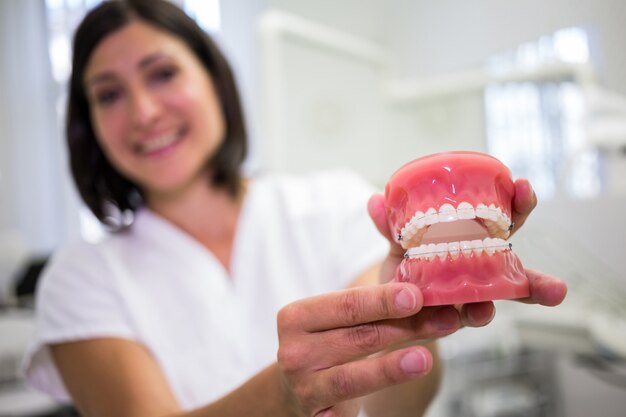Introduction:
A vibrant smile is a universal symbol of joy and confidence. For individuals in Richmond seeking smile restoration, dentures emerge as a comprehensive solution to replace missing teeth and restore both aesthetics and functionality. This guide delves into the world of dentures, exploring their types, benefits, and the transformative impact they can have on oral health and overall well-being.
Understanding Dentures:
Dentures are prosthetic devices designed to replace missing teeth and surrounding tissues. These removable appliances come in various types, catering to different degrees of tooth loss and individual needs. From partial dentures that replace a few missing teeth to full dentures that restore an entire arch, these devices provide a practical and aesthetically pleasing solution for those seeking smile restoration.
- Types of Dentures:
a. Full Dentures: Complete dentures are used when all natural teeth are missing in either the upper or lower jaw. They consist of a full set of artificial teeth attached to an acrylic base that fits over the gums.
b. Partial Dentures: Partial dentures are designed for individuals with some natural teeth remaining. They include artificial teeth attached to a metal or acrylic framework, which clasps onto existing teeth for stability.
c. Immediate Dentures: These are temporary dentures provided immediately after tooth extraction, allowing individuals to maintain a functional smile during the healing process.
d. Overdentures: Overdentures are designed to fit over a few remaining natural teeth or dental implants, providing enhanced stability and support.
Benefits of Dentures in Richmond:
- Restoring Aesthetics and Confidence:
Dentures play a pivotal role in restoring the aesthetics of a smile, boosting an individual's confidence and self-esteem. The appearance of natural-looking artificial teeth contributes to a seamless and natural smile, allowing individuals to confidently interact in social and professional settings.
- Improved Speech and Communication:
Missing teeth can impact speech clarity and pronunciation. Dentures fill the gaps left by missing teeth, aiding in speech improvement and facilitating effective communication. Individuals can speak more confidently, free from concerns about speech impediments caused by tooth loss.
- Enhanced Chewing Functionality:
Missing teeth can make chewing and eating challenging, affecting an individual's ability to enjoy a varied and nutritious diet. Dentures restore the functionality of the mouth, enabling proper chewing of food and contributing to better digestion and overall nutritional health.
- Preservation of Facial Structure:
Tooth loss can lead to changes in facial structure, causing sagging and a prematurely aged appearance. Dentures provide support to facial muscles, helping maintain the natural contours of the face and preventing the sunken appearance associated with tooth loss.
- Customization for Comfort:
Modern dentures are crafted with precision, ensuring a comfortable fit tailored to the unique contours of an individual's mouth. Denture wearers can experience improved comfort, allowing for extended wear without discomfort or irritation.
The Denture Process in Richmond:
- Consultation and Evaluation:
The denture restoration process typically begins with a comprehensive consultation and evaluation. The dentist assesses the patient's oral health, discusses their specific needs and preferences, and determines the most suitable type of denture for their situation.
- Impressions and Fabrication:
Accurate impressions of the oral structures are taken to create custom-fitted dentures. The fabrication process involves crafting the artificial teeth and the denture base to ensure a precise fit and a natural appearance.
- Fitting and Adjustments:
Once the dentures are ready, the patient undergoes a fitting session. The dentist ensures that the dentures align properly and make necessary adjustments to enhance comfort and functionality. Regular follow-up appointments may be scheduled to address any additional adjustments needed during the initial adjustment period.
Transformative Impact on Oral Health:
- Prevention of Further Tooth Loss:
Dentures not only replace missing teeth but also prevent further tooth loss by providing support to adjacent natural teeth and maintaining proper bite alignment. This proactive approach contributes to the preservation of existing teeth and oral health.
- Oral Health Stability:
Dentures contribute to oral health stability by preventing issues associated with tooth loss, such as shifting of remaining teeth, misalignment, and increased risk of gum disease. A stable oral environment promotes overall well-being and reduces the likelihood of complications.
- Long-Term Solution:
With proper care and maintenance, dentures can serve as a long-term solution for individuals seeking smile restoration. Routine check-ups with a dentist in Richmond ensure the ongoing health of the oral cavity and address any adjustments or replacements needed over time.
Conclusion:
In conclusion, denture in Richmond emerge as a comprehensive solution for smile restoration, addressing both the aesthetic and functional aspects of tooth loss. The benefits of dentures extend beyond the surface, impacting speech, chewing functionality, and overall oral health. As a transformative tool, dentures not only restore smiles but also contribute to increased confidence, improved communication, and enhanced well-being.
The denture restoration process, from consultation to fitting, is a collaborative effort between the patient and the dentist, ensuring a customized and comfortable solution. With the ability to preserve facial structure, prevent further tooth loss, and provide a long-term smile restoration solution, dentures stand as a valuable option for those seeking to regain the radiance of a complete and confident smile in Richmond. Regular dental check-ups and proper care further contribute to the enduring success of dentures, making them a reliable and transformative choice for individuals on the journey to optimal oral health and a vibrant smile.





Comments